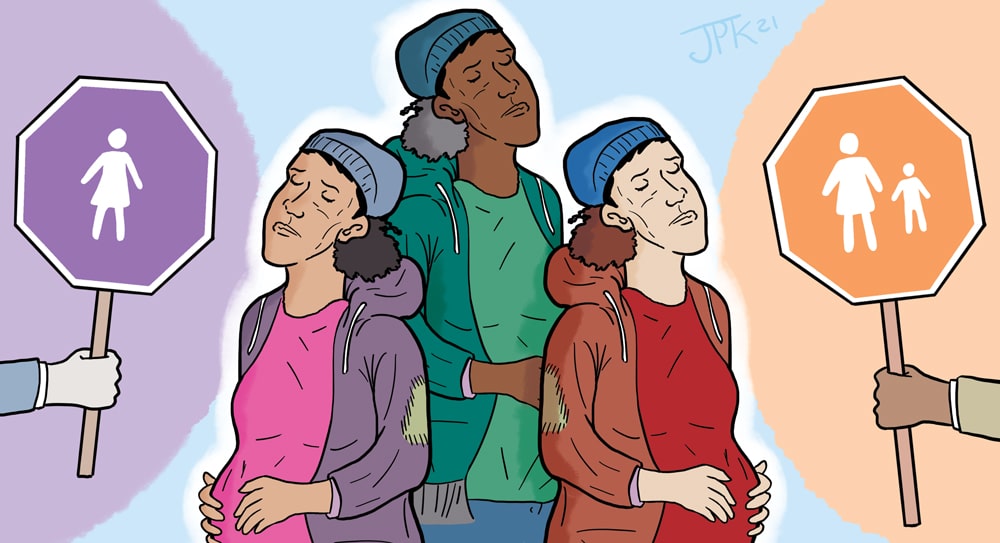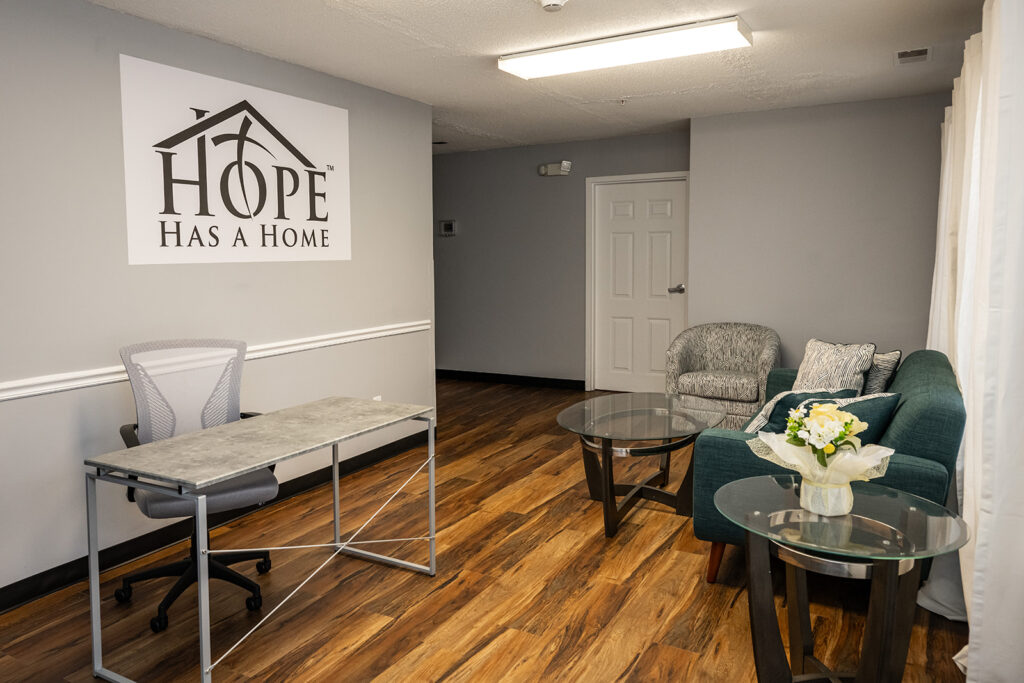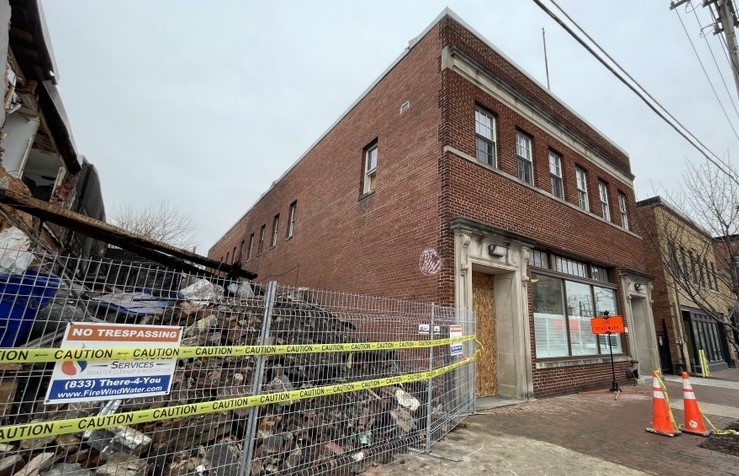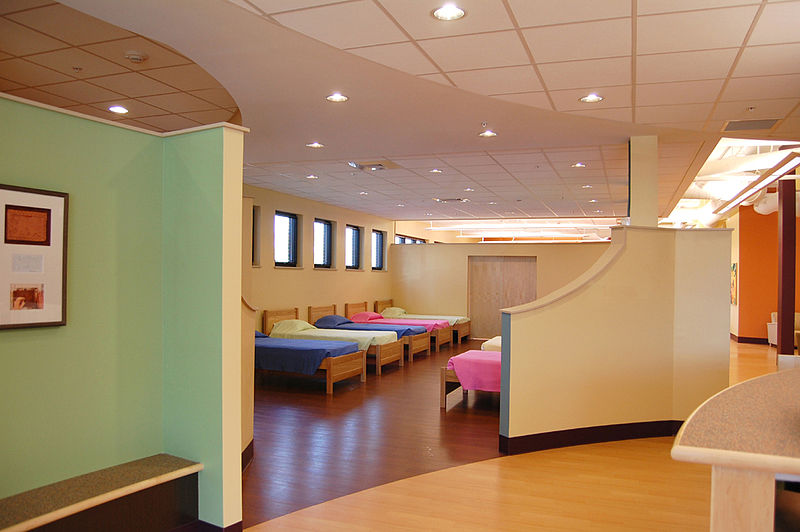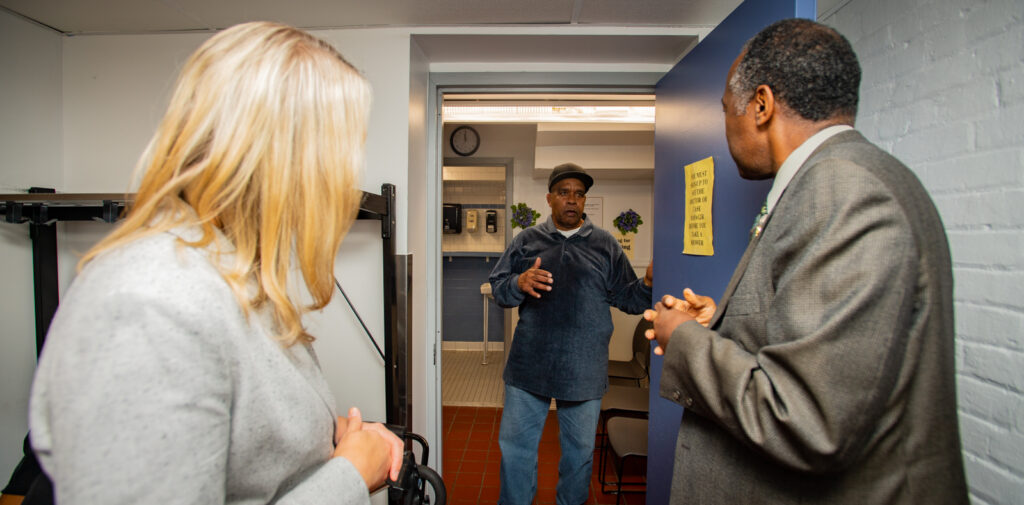Taylar Nuevelle is not a social worker. She is not a representative working on behalf of a government agency. She is not a wealthy philanthropist feeling charitable. She’s a disrupter with a very specific cause: helping unhoused women get back on their feet. Nuevelle runs Who Speaks for Me?, a D.C.-based advocacy nonprofit organization.

On many Saturday afternoons, you can find Nuevelle and a couple of dedicated volunteers outside of the Harriet Tubman Women’s Shelter, located in Ward 6 just behind the D.C. Jail on the former D.C. General Hospital campus. During the pandemic, the dilapidated building has provided up to 130 beds for single women. It’s a pretty bleak landscape; abandoned buildings and torn-up side roads surround the shelter. But like clockwork, when the women living there notice Nuevelle’s car pull up to the parking lot across the street, they line up to receive coats, boots, toiletries, socks, hand sanitizer and, perhaps, some hope.
Nuevelle has had run-ins with security and staff at the shelters when she has come to give away items. She questions the rules about donations and visitors. She challenges the staff to do more to help residents find permanent housing and get the personal items they need.
She’s no longer allowed on the same side of the street as the shelter, she explained on a recent Saturday as women approached her tables individually. “They had security come out and physically move my tables off their property,” she said with a laugh. Yet she perseveres.
Crowded, low-barrier shelters like Tubman are the only D.C. Department of Human Services spaces available to unhoused pregnant women in their first or second trimester who do not have minor children already. They cannot access a private space in a family shelter just yet because D.C.’s Homeless Services Reform Act has, since 2005, defined a “family” as someone with a minor or dependent child, or “a pregnant woman in her third trimester.” Nuevelle challenges the wisdom of the law, explaining that it doesn’t sufficiently address the needs of expectant mothers.
Research shows that adverse environmental conditions, like being unhoused or living through a pandemic, can have a negative effect on mothers and their babies. Despite the city’s various efforts to prevent homelessness, the obstacle presented to single, pregnant women seeking adequate shelter during their first two trimesters has yet to be formally addressed. Even an estimate of how many women experience this each year is hard to come by.
Housing is prenatal health care
As reported by Street Sense Media in 2019, housing for pregnant women is critical to maternal and infant health. According to the United Health Foundation, the maternal mortality rate in D.C. was 35.6 per 100,000 live births in 2019, compared with 29.6 nationally. The rate for Black women is 71 deaths per 100,000 live births in D.C., compared with 63.8 nationally.
[Read more: Are you pregnant enough to take shelter here?]
The D.C. Primary Care Association’s 2018 maternal health outcomes report shows the city’s infant mortality rate was 7.1 per 1,000 births, compared with 5.9 per 1,000 births nationally.
All applicants for family shelter, including these women, apply through the Virginia Williams Family Resource Center in Northeast, the central intake for D.C.’s coordinated homelessness assistance system for families with children. From April to December 2020, there were 467 women in their third trimester without minor children who presented at Virginia Williams for housing assistance, according to DHS data. So far in 2021, there have been 133 women in their third trimester without minor children. Combined, those 600 women represent 51% of expectant mothers in their third trimester seen by the resource center in that time frame.
The correlation between housing and good prenatal care is substantial. Dr. Siobhan Burke, OB-GYN at Unity Health Care, D.C.’s largest health care provider for people experiencing homelessness, said stress and a lack of healthy food access can take a serious toll.

“Homelessness and constantly worrying about where you’re going to stay the next night is going to have effects on your health whether you’re pregnant or not,” Burke said. “We already know that extra stress can lead to problems with fetal growth. There can be problems with food insecurity and the way the baby grows, being too small. Or, conversely, if they don’t have access to high-quality food, they can be at a higher risk for diabetes, and that is another set of complications.”
Burke further explained the repercussions of homelessness and poor nutrition on pregnant women: Eating too many sugary or processed foods can lead to gestational diabetes and infants born with heart defects. And a lack of access to fresh fruits and vegetables is one of the causes of below-average gestational size and low birth weight, she said.
According to a 2018 report, the District’s Child Fatality Review Committee reviewed the records of 33 infant deaths by natural causes in 2017 and found that all had been born prematurely (in the second trimester) and weighed less than the expected birth weight for their gestational age. Homelessness was identified as a common “environmental risk factor” for the mothers whose infants died in 2017. The other three factors identified by the committee were histories of domestic violence, abuse or neglect, and mental health issues. In the 2019 report, the city’s Infant Mortality Review Team acknowledged that the stress of housing insecurity can impact family functioning. While it recognizes the general negative impact of a mother’s housing insecurity on infants, the Office of the Chief Medical Examiner said it does not keep track of a mother’s housing status when assessing infant deaths.
A history of macro- and microaggressions
The D.C. Council on March 1 held an oversight hearing of DHS. Susan Gallucci, executive director of The Northwest Center — a nonprofit organization in Lanier Heights that helps pregnant mothers and families prepare for childbirth, including those who are unhoused — expressed grave concern about the treatment of expectant mothers at the Virginia Williams Family Resource Center as well as at low-barrier shelters.

“From what I’ve been told by the women that we serve, the intake process has become more like an interrogation and less like questions for an intake,” Gallucci told the council. “There has been an increase in complaints about the way in which a woman has been treated. Their requirements appear to have become more and more stringent and create additional barriers for pregnant women and families experiencing homelessness to find a safe, stable shelter.”
The Homeless Services Reform Act was amended in 2017, growing in length from 26 to 85 pages. The detailed update included increased scrutiny to keep families who were last housed outside of the District from entering D.C.’s family shelters. Every family applying for shelter is also required to be screened first for eligibility for the Homeless Prevention Program, which provides limited cash assistance and counseling to help stabilize homeless families so they can stay with other family members or friends instead of entering the family shelter system.
[Read more: Seeing Double: DC drastically reduces the number of people in shelter as more double up]
In her testimony, Gallucci spoke about how pregnant women are pressed to present current D.C. identification — even if it’s a lease from whichever friend whose couch they were staying on, or a copy of a deceased grandmother’s lease — as proof that they are eligible for low-barrier shelter. In 2019, Washington City Paper reported that a homeless woman who was pregnant and accompanied by her one-year-old daughter — thus meeting the HSRA’s definition for a family — was denied shelter because she had lived in Maryland more than a year ago. She was a native Washingtonian.
Nuevelle seconds the concern about a lack of respect and aggressive treatment of pregnant women at Virginia Williams and women’s shelters. “When I was dealing with a pregnant woman in the summer, they were patting the women down, checking their bags without gloves or masks,” Nuevelle said. “It was almost like they were incarcerated. Even at the low-barrier shelters, they pat women down.”

In April 2020, Nuevelle helped Ikea (pronounced Ah-Kee-ya) — a 25-year-old woman who was pregnant — get a private room in the family shelter system. Leaving the emergency shelter at King Greenleaf Recreation Center in Southwest made a world of difference, Ikea said in a video Nuevelle recorded soon after the move. “We had to pee and poop outside. I guess the staff was afraid of the corona. They put us all outside from 8 a.m. until about 4 or 5 p.m.,” she said.
Harriet Tubman residents complained about the same kind of treatment in an October 2020 Street Sense Media article.
[Read more: Low-barrier shelter residents say staff abuse them amid ‘terrible’ conditions during COVID-19]
Even if they get to a family shelter in their third trimester, Nuevelle said, women may not get the services — or respect — that they need and deserve.
“No one really cares,” she said. “Once the women get to the family shelter, there’s this push like they’ve overstayed their welcome as opposed to, ‘Take your time. It’s a pandemic.’ And when they go from low-barrier shelters to family shelters, they have a lot of catching up to do. They need help with making sure they have their WIC [food stamps for Women, Infants, and Children] and housing. Most of these women don’t have jobs. And if they do, they have to pay for child care, baby clothes, and they have to pay for cell phones. That’s why many of them don’t have phones.
“There’s a lack of respect for the trauma of being homeless and pregnant,” Nuevelle added.
According to DHS, its Office of Program Review, Monitoring and Investigation received 51 complaints from across the District’s shelter system between Oct. 1, 2019, and March 8, 2021. At least 73% of those complaints came from women clients at the low-barrier shelters, said Rachel Pierre, who heads the agency’s Family Services Administration. According to DHS data, the majority of complaints across all low-barrier shelter locations fell into the categories of “maintenance” and “issue/violation.” The department would not disclose what types of complaints were filed from which individual shelters.
DHS caseworkers and providers are expected to treat customers with respect, and the agency treats complaints seriously, according to Pierre. “Unfortunately, anything can happen where their interaction is less favorable,” she said. “That’s when we want it brought to the supervisor so they can address the behavior and so we can address the expectation. We have an expectation that our families are treated with dignity.”

Sheltering in place during a pandemic
When COVID-19 shut down city operations in March 2020, people were told to stay at home. Modes of communication swiftly changed from in-person contact to emails, conference calls and video conferencing. That transition wasn’t easy for people on the wrong side of the digital divide. Lack of access to phones and the internet created new challenges for people experiencing homelessness.
Unity Health Care’s Burke said telehealth can be helpful but only when the moms are equipped to participate. “Telehealth has been key to getting through this pandemic. And we’ve been trying to do our care through telehealth, but not too much because some of them don’t have phones,” she said. “Even if we get them into care, we sometimes lose them for a while because we don’t have a contact for them.”
Sheltering in place at a low-barrier shelter is not appropriate for an expectant mother in any trimester, advocates say. It’s hard to maintain 6 feet of distance. You can’t control how much other people will clean or whether they will wear masks. Most of all, there is very little privacy for things like telehealth prenatal visits.
“We’re being told in the pandemic to stay in your home, don’t interact with strangers, limit your exposure with others,” said Amber Harding, staff attorney with the Washington Legal Clinic for the Homeless. “But the family shelter process forces people to stay with others and have contact with strangers or they won’t be found eligible.”
Preparing for childbirth takes a lot of work that’s difficult to accomplish when restrictions are in place all around the city. The stress to get ready for the baby is exasperated by COVID guidelines, Harding added. “There’s a lot of pressure about what you’re going to do when you have the baby. I can imagine that for women who are homeless and pregnant that pressure is amplified. There’s no assurance that you’re going to have a safe place to go when you leave the hospital. It’s incredibly stressful.”
Temporary solutions for a temporary situation
Ward 1 Councilmember Brianne Nadeau heads the Committee on Human Services, which oversees the operations of DHS. She is focused on early interventions to prevent homelessness but also has been working on possible policy changes that would provide solutions for unhoused pregnant women, including access to family shelters.
As reported by Street Sense Media in 2019, a homeless mother who testified during Nadeau’s DHS oversight hearing that year said she was denied family shelter access three times during hypothermia season in spite of having a 5-year-old son with her. She was only allowed access on her fourth attempt because she was also accompanied by a lawyer. She said the treatment grew worse at the private shelter. “I was constantly harassed by staff and told that I was going to be terminated because … I wasn’t in my third trimester. And also because my doctor had pen-wrote-in my due date and put the signature beside there.”
At Nadeau’s DHS oversight hearing last month, The Northwest Center’s Gallucci testified about the poor treatment expectant mothers receive at the Virginia Williams Family Resource Center and the “stringent” requirements that she believes are intended to discourage women from applying for shelter. “I spoke with a pregnant woman who had been living with her grandmother and then went to Virginia Williams when her grandmother passed away — and then was told that she had to obtain a copy of her deceased grandmother’s lease in order to receive services.”
Gallucci also explained how the third-trimester requirement endangers infants and mothers. “This policy works against D.C.’s efforts to improve infant maternal health outcomes. According to a May 2018 report by the DC Department of Health entitled ‘Perinatal Health and Infant Mortality,’ low-income and minority women suffer maternal and infant complications during and directly after their pregnancies at a far higher rate than their more affluent and non-minority peers. … In 2016, the Black infant mortality rate in D.C. was 9 times higher than that of white infants.”
Nadeau, who gave birth to her second child last summer, indicated that she’s on board with enacting changes but did not give a timeline of when she would introduce legislation. “Our pregnant mothers need as much support as we can get them here in the District. So if that means that we need to reexamine the policy when they’re eligible for family shelter, I’m happy to do it. But I also just want to be mostly focused on how we’re getting them the right services,” Nadeau said in an interview.
“Ideally you can help them permanently before they give birth,” she added. “You want that mom to not be worrying about her housing when she has a newborn.”
Pierre echoed Nadeau’s sentiments about the value of getting women access to interventions earlier in their pregnancies. She pointed to programs such as Project Connect through Catholic Charities and the Homeless Prevention Program through Community of Hope as services available to pregnant women experiencing homelessness in the District.
Ultimately, the scope of the problem is not adequately understood and therefore cannot yet be adequately addressed. The annual “Point-in-Time Count” of people experiencing homelessness does not report how many women surveyed were pregnant, and DHS did not respond in time for publication to questions about how pregnancy among low-barrier shelter residents is tracked. The only data point currently available to assess how many expectant mothers are in need is the number of people who receive services from the Virginia Williams Family Resource Center, which does not include anyone in their first or second trimester.
This article was co-published with TheDCLine.org.
